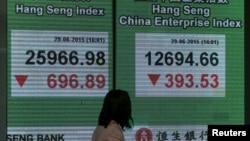Concerns about the Greek financial crisis widening to affect the global financial system prompted widespread selling of stocks Monday in Asia, while China's volatile markets were poised to enter a bear market mainly due to domestic issues.
The region’s equities markets were the first able to react to the surprise announcement by Athens to call for a national referendum, shut banks and impose capital controls after the European Central Bank announced Sunday that Greece’s banks would not be receiving more emergency loans.
“There had been some complacency in global markets around a possible Greek exit from the eurozone, but that is clearly being shaken off at the moment. So I think that'll continue to dominate markets this week,” said analyst Erwin Sanft at Macquarie Securities in Hong Kong.
The benchmark Nikkei 225 index in Tokyo was off nearly 600 points at Monday’s close – a drop of almost 2.9 percent.
South Korea’s KOSPI dropped more than 1.4 percent on the day.
There were also significant drops in stock markets from Australia to India (the BSE Sensex in Mumbai in early trading plunged more than 500 points before recovering somewhat to close down 0.6%).
The nervousness was more palpable on Chinese exchanges. The closely watched Shanghai Composite index fluctuated by more than 10 percentage points, the biggest single-day point swing since 1992.
The Shenzhen stock exchange’s component index dropped nearly 5.8 percent. Hong Kong’s Hang Seng fell 2.78 percent.
A mid-session statement on the social media site Sina Weibo from the China Securities Regulatory Committee stemmed some of the panic by assuring the domestic market “at the moment the risks associated with short selling and margin trading are generally under control.”
A structural issue remains, however, according to Macquarie's Sanft who told VOA “the margin position or level still has to be brought down at some point.”
Shanghai, at its peak on June 12, had soared more than 150 percent during the past 12 months and has dropped 20 percent since then.
“Technically, that’s a bear market in fairly short order,” said David Welch, head of equity sales trading for Reorient Group in Hong Kong.
A Saturday interest rate cut by Beijing failed to stem significant drops seen last week.
Analysts for months have been warning of an equity bubble in China with many inexperienced leveraged investors bound to suffer.
“As much as it may be painful to say it, I think the correction we've had over the last two to three weeks has been healthy because it's taken a lot of the leverage out of the system,” Welch told VOA.
“Certainly there's going to be a lot of people who have lost a tremendous amount of money given the market's down 20 percent and a lot of the people have been trading on leverage.”
China's regulators have spoken of building a slow-go market for the long run and “part of that is not allowing a massive bubble to inflate and then ultimately pop,” Welch explained.
In currency trading in Asia, increasing prospects that Greece could be forced out of the euro sent the single currency falling three percent against the yen
Gold, traditionally a safe haven in times of uncertainty, gained 0.8 percent to move above $1,184 an ounce.







